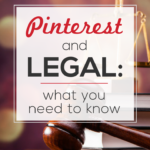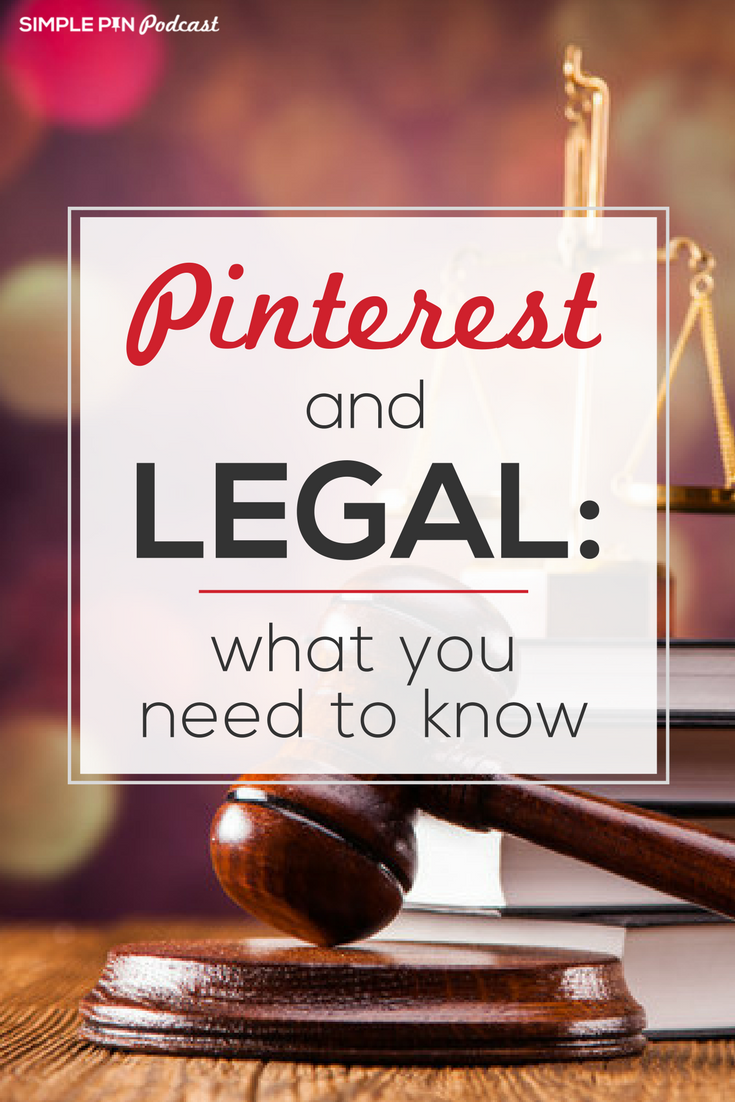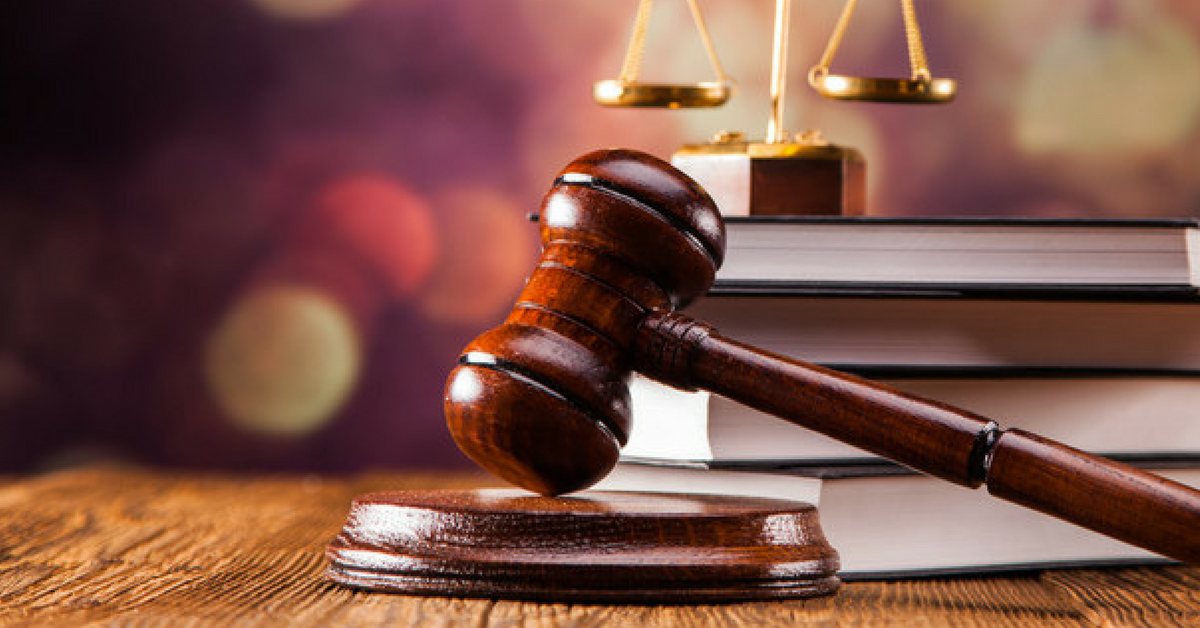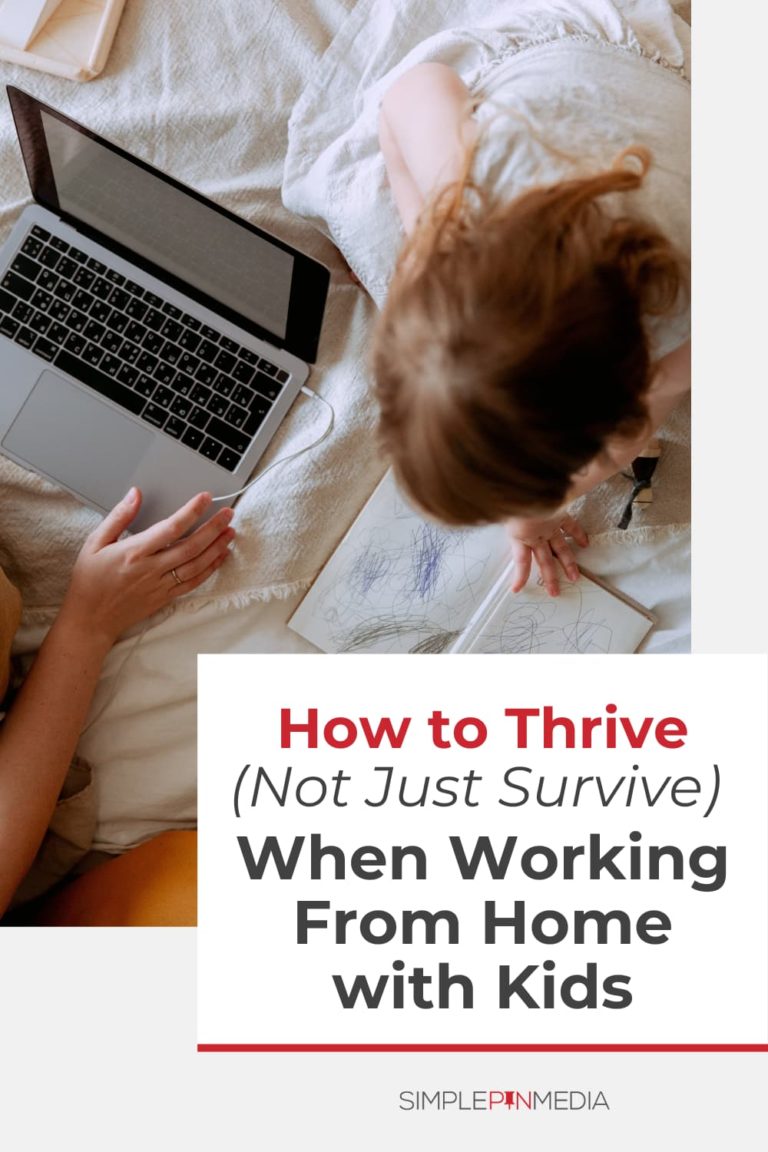Most of the time on this show, I interview bloggers and social media experts and share advice for you to use to grow your Pinterest account. But for the past several weeks, I have been focusing in on the basics. Things like business ethics, how Pinterest compares with Facebook, the most common mistakes I see people making on Pinterest, using Pinterest for very tight niches, answering the most common Pinterest marketing questions that I get on a weekly basis, and what to do if you are brand new to Pinterest and need a step-by-step guide to get you started.
Today, I am continuing in that series by talking about Pinterest legal issues. I first heard today’s guest while I was listening to a business podcast at the gym, and I immediately knew I had some work to do on the legal side as far as setting up contracts with my clients. So if the owner of a Pinterest management company has some work to do on the legal side, I am betting some of you might need to do the same.
Pinterest Legal Issues: What You Need to Know
Why You Need Contracts in Your Business
If you are a business owner, then you know how it goes. Someone emails you to ask about your prices or your business. You email them back. Before you know it, you’ve shared dozens of emails, maybe a few Facebook messages, a text or two, and you feel like you really know this person. You’ve built up that “know, like, and trust” factor.
But do you really know them? Can you trust them? Could there be things coming down the pike that you simply can’t foresee?
If thinking about the legal issues makes your eyes glaze over, don’t worry! Danielle is here to make this as easy as possible, and to show you that the legal side can be completely accessible. Ignoring the legal stuff can cause some real problems in the future, so let’s dig in and learn what we all need to do to not only protect ourselves but our clients as well.
Are Your Images on Pinterest Protected by Copyright?
Have you ever seen one of your images on someone else’s pin with a link back to their own website? Do you wonder how the copyright laws come into play in a situation like this? And what are the copyright laws? How do they apply to social media platforms? Can just anybody take your images and use them freely and link them to wherever they want?
A few things to know about copyright-
- You have a copyright for originally authored content even if you haven’t registered it with the copyright office. This would include images. You have the right to display that work reproduce it, create derivative works, and the right to distribute and sell.
- Your first step when you think your copyright has been infringed upon is to reach out to the person. Many people have no idea that they’ve breached a copyright by using an image they found on social media. A simple, friendly request asking them to remove the image will oftentimes result in an apology and a removal of the image.
- If you can’t find any contact information for them, your next step is a DMCA takedown request. This request goes to the host of the website that has your image on it. If the image is on Pinterest, there is a form on Pinterest that you can use to submit the DMCA request through Pinterest.
- Be clear on your site terms. Make it clear through your site terms whether people can or can’t use your images or other content and how they are allowed to use it.
How Do You Disclose Affiliate Links on Pinterest?
Now that Pinterest is allowing affiliate links on their platform (other than Amazon), how and where do you disclose that a link is an affiliate link? Is there one certain way to do it? Are there specific words to use?
According to Danielle, there are a couple of different ways you can go with this. First, the FTC has approved certain words for this purpose which are “sponsored” or “ad”. You can put either of those words at the front or the end of your link. The word “affiliate” is not approved, simply because it isn’t as obvious to some people that you are making money off of that link.
If using the word “sponsored” isn’t what you want to do, work on your pin descriptions using language that’s as natural as possible, but that also makes it clear that you are using an affiliate link. Something like, “This is my favorite cleaning product. I use it in my home daily. This is an affiliate link. If you click through and make a purchase, I will be compensated. Please be assured that I only share affiliate links for products that I actually use and love.”
Note that Etsy affiliate links are no longer allowed to be used on Pinterest. Updated April 2018.
*I actually wrote an article last year for Social Media Examiner on using affiliate links on Pinterest.
What Is the Best Way to Run a Contest on Pinterest?
Back in the early days of the platform, there were people using a “pin it to win it” strategy. It didn’t take long for Pinterest to crack down on that strategy and shut it down completely. But contests can be very successful on Pinterest if you know how to execute them correctly.
It is imperative that on your contest entry, you make it perfectly clear that it is, in fact, a contest entry. If you’re using hashtags, put the word “contest” in there. You can use the word “sweepstakes” in your hashtag as well, but you are not allowed to use “sweep”. According to the FTC, that is not clear enough.
What Is Expected of You When Working with Brands
If you have ever worked with a sponsored contract, you might already be familiar with the fact that the legal ramifications aren’t always well mapped out ahead of time. It isn’t always clear exactly what is expected of you as far as Pinterest or other social media channels are concerned. This is just another reason why having contracts in place before doing business is so important.
This contract should clearly state what you will deliver on the part of your client. If they leave the social media content up to your discretion, try to at least find out which platforms the brand is most interested in. Make your deliverables as clear as possible.
Also, make sure your payment policy is in place so that you know when and how you are getting paid. If the brand asks for a confidentiality agreement, be sure to have that in place. You do not want to be held in breach of contract if you disclose something that they wanted to be held in confidence. In the case of termination of the contract, you need to know how you will be paid for the work you’ve already done.
One of the biggest issues in working with brands is content ownership. Who owns the content that you produce for the brand? Do they own it? If so, what can you do with it? Can you create derivative works from it? Is there a set time for you to use it and then you have to stop? And if ownership stays with you, then lay out specifically in the contract what the brand is allowed to do with the content.
If You’ve Never Thought About Legal Issues, Where Do You Begin?
Danielle and her partner in the firm have a solid background in working with clients who need regular contract reviews for their work with sponsored content. If you aren’t familiar with the guidelines for influencer marketing, Danielle can explain those to you in a way that will make it much easier for you going forward. Even if you’ve never done it in the past, you can course correct and do things the right way from now on.
Danielle has also created a second site called Businessese, where they create custom templates for online business owners and influencers. These templates are DIY friendly and specific to the needs of the industry. Also offered on the site are courses on pricing and campaign reporting.
Campaign reporting is important when working with sponsored content, especially on Pinterest. Because of the spider effect of Pinterest, it can be impossible to have solid numbers to report to the brand. Do you report repins? Impressions? This course will help you know what and how to report those numbers.
The more specific you can be [in your contract], the better. You can always amend a contract, but it’s hard to add something in after the fact. Trying to interpret something that wasn’t there is tricky. The more detail you put in at the beginning, the more helpful it is in the long run.
~Danielle Liss
Pinterest and Legal Issues: Final Tips
We began the conversation talking about copyright, and Danielle also closes with it. She stresses to my listeners the absolute importance of knowing the copyright laws. You may be using something you don’t have the right to use and you aren’t even aware of it.
You don’t want to find yourself in the position of receiving a DMCA letter. It’s one thing to send a letter like that, but if you receive one and the sender is demanding a hefty sum for the violation, that’s the kind of thing that can quickly sink a startup business. So be cautious with how you’re using other people’s images. When in doubt, ask permission.
And always remember to have a specific contract before you begin any work. If you expect to be paid, know what social media channels you’re expected to work on, and any and all other details of the campaign, you simply must start with a detailed contract.
Connect with Danielle-
Time Stamp-
Intro
1:41 Why do I need to have contracts?
2:51 Are my images on Pinterest protected by copyright?
9:45 What are site terms and do I need them?
11:20 How do I disclose affiliate links on Pinterest?
14:00 What is the best way to run a contest on Pinterest?
18:20 What is expected of me when I work with a brand?
23:35 I’ve never even thought about all this legal stuff…where do I start?
27:50 Last tips from Danielle
What Pinterest legal issues have you been curious about in your online business?










Hello Kate,
Great piece of information over here 🙂
Indeed today INTERNET is the back bone of the present era and we all are working through it. So we need to stay protected by all the legal terms and matters so that our work and business could stay safe from the unknown sources.
No, wonder when ever I fell any doubt about Pinterest, I do visit your site. It has plenty of things which can help us in social media platform. Yeah I have seen many of the pins that have same pictures and the back links compared to ours. This has been a serious issue to concern for many of the bloggers.
Thanks for the share.
Shantanu.
Thanks for all the great tips! I never thought about spelling out my policy on sharing of my content. I will have to add that to my legal page.
Ii also didn’t know it’s OK to put the “Ad” tag after the link. I thought it always had to be before any links on a post. I’ll check into that again.
The page that you linked to said: Must communicate sponsorship in clear, unambiguous language, and appear at the beginning of posts (or “above the fold”) if possible.
Reading through the FTC part IIIA, it seems like after the link could be questionable. It says “above the headline.” Can’t get much higher than that.
So many people don’t disclose at all though – or seem to hide it if they do.
There is this article too https://www.tricia.me/2013/03/14/affiliates-take-note-new-ftc-disclosure-guidelines/
I think Pinterest is a great app, however since I came back to it this year and used it sparingly for my own uploads and a few recipe and nature Pins, they have shown extremely unethical behavior. I am not saying they are wrong, but they handle their policies with disregard and some support with privacy issues to my mind.
They deactivated me and refuse to tell me what is the spam likely cause. After being very patient and polite, I finally got them to say at least it may be similar Pins. I do not spam, never have. I use nothing illegal. Yet they obfuscate their own decisions and policies now, they did not do that back in 2017.
On top of this, they took my request to deactivate my account and they said it was taken offline. I know that, but I wanted it removed entirely if they want to keep me down for unclaimed reasons. So be it, I do not want to fight and carry on. Then they tell me they won’t renew my account, yes I know, but I want it removed or deactivated as they offer, this is not just not renewing as items still sit there.
So they close the ticket and I am very upset and yet sad as an IT professional where we NEVER would blindside a customer and refuse to answer directly, then throw the rightful customer requests under the bus and run away.
What is going on at Pinterest lately? This goes beyond copyright. We use a paid Stock Photo service to remain legal not Pinterest.
Unfortunately, this is not an uncommon scenario. I’d advise you to listen to this podcast episode on what to do if your Pinterest account gets suspended .
Be persistent!
I am just a mon who sends and receives good morning and good night pictures to and from my loves ones
I received this picture on WhatsApp and load it onto Pinterest not knowing it has copyright on IT
DELETE THE PINS THAT HAS COPYRIGHT
I DON’T WANT THEM
I DIDN’T DO IT ON PURPOSE
PLEASE I JUST WANT MY PERSONAL PHOTOS AND RECIPES
So sorry to hear about your lost images, Sonette! I would recommend that you contact the Pinterest help desk to see if they can get it sorted out for you –> https://help.pinterest.com/en/contact